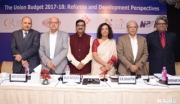The Union Budget 2017-18: Reforms and Development Perspectives
04 Feb 2017
Past Event

The 5-Institute Budget Seminar 2017-18 brought together the heads of the five institutes —CPR, ICRIER, IDF, NCAER, and NIPFP to share a reflective view of the Union Budget and its longer-term implications for the Indian economy under the leadership of the NDA Government, now well into its second half.
Expectations from the fourth budget of the Government of Prime Minister Modi are running high. The debate on the short and longer-term impact of the November demonetisation continues, with the Budget expected to present some novel measures to compensate for the costs. GST is slowly but surely moving forward, the Committee looking into the Fiscal Responsibility and Budget Management Act has completed its work, and discussion of the pluses and minuses of fiscal consolidation and the implications for monetary policy continue. Several important fiscal reforms are expected that we hope will improve the fiscal health of the economy and lay strong foundations for lifting sentiment and for sustained, rapid growth that creates rural and urban jobs. At the same time, uncertainty in global markets shows no signs of letting up, especially with Brexit and the arrival of the new US President. The executive directors of these five India’s leading economic policy research institutes came together in March 2007 for the first time to present to present their assessment of the longer term reform and development implications of the Budget.
As done for the past 10 years, these five institutions again came together at this seminar to be held at the Taj Mahal Hotel, New Delhi, to present their more reflective assessment of the Union Budget 2017-18.
Mr Ashok K. Bhattacharya, the Editor of the Business Standard, moderated the discussion and the Q&A with the audience.











